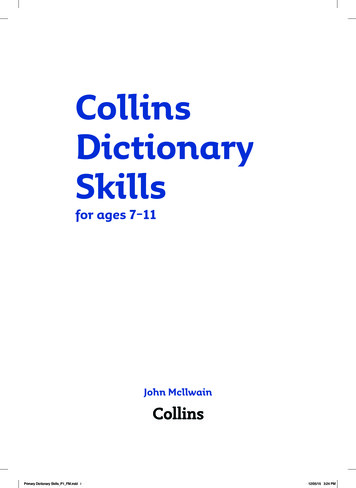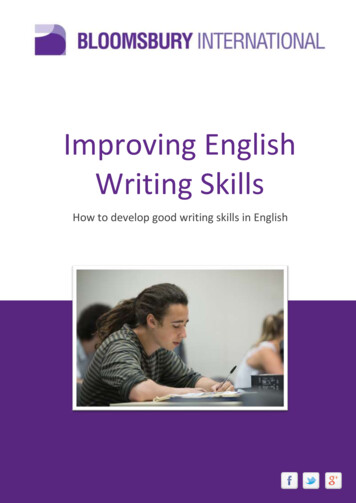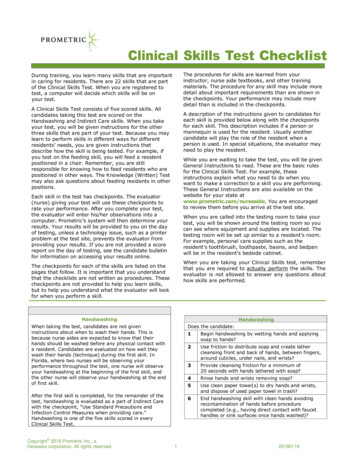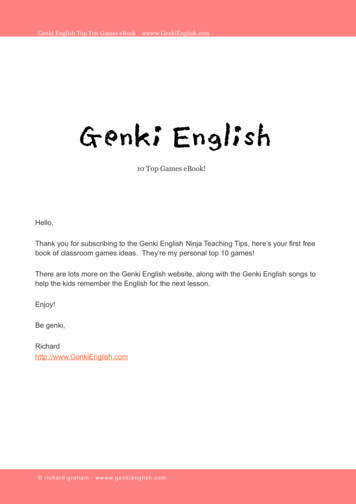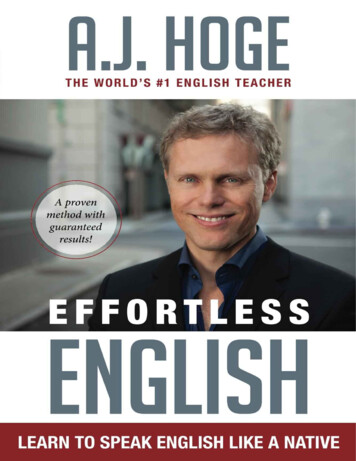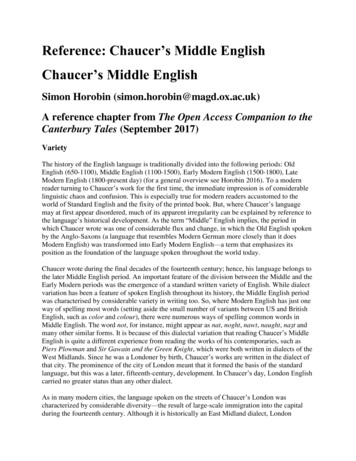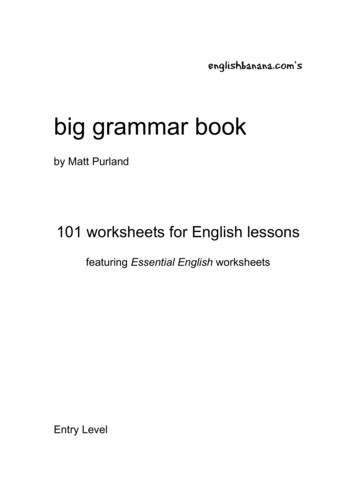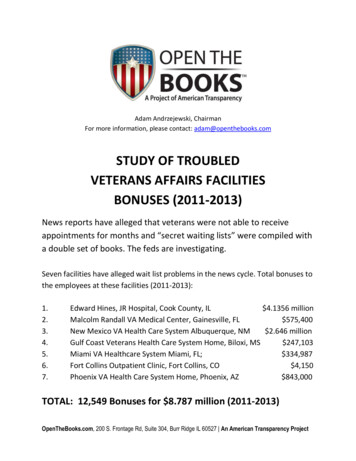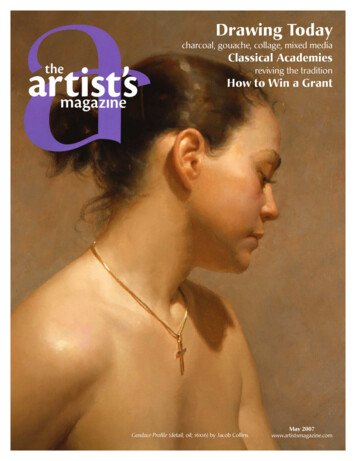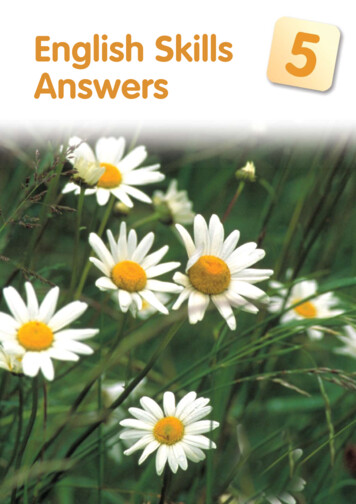
Transcription
English SkillsAnswers
ContentsReadingChinese New YearActivitiesProofreadingCapital LettersWritingUsing WordsPublished by CollinsAn imprint of HarperCollinsPublishers77–85 Fulham Palace RoadHammersmithLondonW6 8JBBrowse the complete Collins catalogue atwww.collinseducation.com HarperCollinsPublishers Limited 2011, on behalf of the authorFirst published in 2006 by Folens Limited.ISBN-13: 978-0-00-743722-1All rights reserved. No part of this publication may be reproduced, stored in a retrievalsystem, or transmitted in any form or by any means, electronic, mechanical, photocopying,recording or otherwise, without the prior written permission of the Publisher or a licencepermitting restricted copying in the United Kingdom issued by the Copyright LicensingAgency Ltd, 90 Tottenham Court Road, London W1T 4LP.British Library Cataloguing in Publication DataA catalogue record for this publication is available from the British Library.Every effort has been made to trace copyright holders and to obtain their permissionfor the use of copyright material. The authors and publishers will gladly receive anyinformation enabling them to rectify any error or omission in subsequent editions.Editor: Geraldine SowerbyLayout artist: Suzanne WardIllustrations: Tony RandallCover design: Martin CrossEditorial consultant: Helen WhittakerPrinted and bound by L.E.G.O. S.p.A. – Lavis (Trento).2456789ReadingThe 15ReadingThe ngular and Plural161718192021ReadingThe Strange ShipActivitiesClozeTypes of NounsWritingPrefixes222324252627ReadingNell and the 0313233ReadingThe Conquest of ms343536373839ReadingThe Magnificent CaveActivitiesClozeVerbsWritingUsing Words404142434445ReadingNanukActivitiesFun with e TitanicActivitiesClozeAdverbsWritingQuotation Marks525354555657ReadingThe Burglar WhoCalled the PoliceActivitiesFun with ActivitiesClozeThe CommaWritingLanguage646566676869ReadingMysteries of MigrationActivitiesClozeThe Apostrophe (‘)WritingLanguage707172737475ReadingThe Enchanted StagActivitiesFun with eadingThe e828384858687ReadingWilliam TellActivitiesClozePrepositionsWritingUsing WordsRevisionLanguageSilent Letters8889909192939495963
ReadingAActivitiesARead the story.Chinese New YearThe ChineseNew Year is themost importantfestival notonly in China,but also formillions ofChinese peopleliving aroundthe world. TheChinese use alunar calendar,based on thechanging phasesof the Moon.Because of this,Chinese New Yearfalls on a differentdate each year, but it usually takes place in January or February.Getting ready for the New Year involves cleaning the house, buying new clothes andputting up New Year decorations. New Year’s Eve dinner is the biggest meal of the year,and many of the dishes have a symbolic meaning. For example, the dumplings which areeaten represent wealth, because they are similar in shape to ancient Chinese gold or silveringots.As soon as the New Year arrives, firecrackers are set off. Red packets (which are simplyred envelopes with money in), are exchanged. Giving someone a red packet is a way ofwishing them good luck and wealth for the coming year. Dragon dancing is another customassociated with Chinese New Year. The Lantern Festival, which takes place on the first fullMoon of the year, marks the end of the two-week long New Year celebrations.No one really knows the origins of the New Year celebrations in China, but legend hasit that a beast called Nian appeared every year atthe same time and ate people, until a wise old manfound a way to stop it. The grateful people begancelebrating the anniversary of the beast’s defeat.Every Chinese year is named after one of twelveanimals: rat, ox, tiger, rabbit, dragon, snake, horse,ram, monkey, rooster, dog or pig. The Chinesebelieve that your personality is influenced by theanimal in whose year you are born.4Answer these questions.1. A calendar based on the changing phases ofthe Moon.2. Usually in January or February.3. Cleaning the house and buying new clothes.4. They represent wealth because they are similarin shape to ancient Chinese gold or silveringots.5. To wish someone good luck and wealth for thecoming year.6. The Lantern Festival.7. Explain the legend behind Chinese New Year in your own words.8. If you could choose one of the twelve animals associated with theChinese calendar, which would you choose and why? BLook up the words in italics in your dictionary.Write an interesting sentence for each one.CSummarise the story in your own words. Use about 10 sentences.DWrite the sentences using to, two or too.tootwo1. David is2. The lasttoilldays wereto3. The teacher told meto4. Prasad wentfriends.5. Mytwo7. I am8. It istootoo10. It istoo13. Thetwowettotoplay games.twoo’clock.twototoyoungearlytoobe admittedtotosoon after dinnertwotoof ustwototoretirehardcousins.the dance.bed.answer.go swimming.toplay in the game.the pop concert may I comeof us were14. The teacher showed the pupilsof herschool by bus.the film today with my11. The teacher ordered12. If you are goingtoothe pop concert.the dance and Satira went withto9. The question wastoleave for home atsisters travel6. I am goinggotootwotiredwaystotoo?play in the garden.tosolve the problem.5
ProofreadingACapital LettersCorrect the mistakes in this story.We use capital letters:l At the beginning of a sentence.l For the letter “I”.l The names and titles of people, e.g. Dr Mary Smith.l The names of places, months of the year, days of the week and specialdays.l Title of things, e.g. Robinson Crusoe, Jaws.The Sick Lion AInsert the capital letters and full stops.It was a gorgeous sunny Saturday in the middle of July. We decided that itwould be a great idea to have a barbecue. We invited Mr and Mrs Jones and theirdaughter, Natalie. We invited Mr Willis and his son, Jake. Naturally we invitedUncle Toby as well.By six o’clock that evening we were all starving. Mum was tending the charcoal.Dad was putting some finishing touches to the kebabs, burgers and chicken legs.Uncle Toby and the rest of the guests had arrived. We hadn’t seen Uncle Toby sinceApril so we had a lot of catching up to do.By half past six the smell of the meat being barbecued was making my knees goweak. The aroma was teasing my nostrils. It was difficult not to just grab a chickenleg and run. However, I managed to control myself and soon we were all tuckinginto food that was every bit as good as it smelt.BInsert the capital letters where needed.1. I am going to the film with George.2. Lille is an industrial city in northern France.3. Mrs Flood went to London and bought a dress in Harrods.4. The President of the United States of America lives in the White House.5. The first of April is called “fools” day.Once, a lion became sick in his lairand many of the other animals cameto visit him.However, the fox never came, andfinally the lion wrote a long letterto him, reminding the fox of theirfriendship and suggesting that hecome and visit the lion’s lair.The fox was in the locality oneday, but after some thought he6went home without seeing the lionand wrote a letter instead. He saidthat he was sorry to hear that thelion was ill and he promised thathe would say lots of prayers for hisrecovery. “But I cannot see my wayto visit you now,” he wrote.“Because while I saw lots offootprints going into your den, I sawnone coming out again.”6. Maha is my cousin and she lives in Kinshasa.7. Every Tuesday in June she visits her Aunt Hannah.8. The Bangladeshi team should win on Saturday.9. Last Sunday I visited my Aunt Erina.CRewrite using fewer ‘ands’ and more full stops.It was a crisp winter’s morning. I jumped out of bed and dressed quickly. Todaywe were going to visit our cousins in Manchester. I hurried downstairs and foundeveryone was waiting for me. Without further delay, I ran to the car and got in. Dadstarted the engine and we were on our way.7
WritingACopy this passage, filling in the blanks.Using WordsAMy name is. My friends call me. I amyears ofage. I haveeyes andhair. My height isand myweight is. I live inwith my. I havebrothers andsisters. I like to playwith my friends after. My favourite hobby is. I have a fine collection of. I should like very much to bewhen I grow up.BWrite a list of your:1.2.3.4.C5 favourite foods.5 favourite drinks.5 favourite films.5 favourite books.5. 5 favourite actors/actresses.6. 5 favourite TV programmes.7. 5 favourite pop groups/singers.Write a description of your best friend.Remember to mention: age, height, likes, dislikes, colour of hair andeyes, dress, habits.Write a or .20.21.22.BDWrite a yearly diary. Include eachyear from your year of birth.Example: 1999: Born in Dubai.EWrite a diary for one day.aThe girl ate an egg andsausage for her breakfast.aanMy brother sawfox andeagle in the forest.anaI sawaeroplane disappear behindwhite cloud.anaThe carpenter hadaxe andsaw in his hand.She gave the boy an apple and an orange.a model.My sister Aditi is an actress and my sister Erina isI have an uncle and an aunt in New York.a white cap.The waitress wore an apron andAn ant and aflea are two tiny insects.The gardener planted an elm tree and an oak tree in the garden.a rose and an orchid.She gave the ladyA ewe isa young sheep.An axe is a useful weapon.a pea.An onion is bigger thanAn ugly earwig crawled undera mossy stone.a yellow canary and aI havetame rabbit.a beaver near theJohn saw an otter andbig dam.Meera saw an unusual animal and an enormouselephant in the zoo.An hour later I visited an ancient castle.An apricot is smaller thana cucumber.A eulogy was given at the graveside.An ostrich and an albatross are two large birds.Write the words.T Y P I SART I SDENT ICYC L ITOUR IC HEM IF LOR IMO T O RBOT ANJ OURNC Someone who types.Someone who sketches pictures.T Someone who extracts teeth.T Someone who rides a bicycle.T Someone who goes on holidays to other countries.T Someone who works in a pharmacy.T Someone who sells flowers.S T Someone who drives a car.S T Someone who studies plants.A L I S T Someone who writes for the newspapers.TTSSSSSIIDictionary Fun. Write five words that include the letters.1. ant (e.g. elephant)7. full2. oil8. ous3. ore9. ment4. all10. ion5. our6. ful89
ReadingAActivitiesARead the story.The SnakeAnswer these questions. (Answer them in sentence-form wherepossible.)1. A monkey. The bunch of bananas distracted histhoughts until he forgot his terror.2. The snake frightened Toto. 3. He yelled and stood with his teeth chattering.4. He made sure that Toto had no bite marks byexamining his hand carefully.5. Toto did not believe that the snake had nottouched him.6. Toto stretched out on the ground.7. Toto was convinced that he was too ill to move.8. Explain: his teeth chattered; distracted his thoughts; the snake’s fangs; piteousentreaty.9. “Toto had wandered in front of me”. Write two sentences of your own, one ofwhich will contain the word “wandered”, and another, the word “wondered”.10. Toto was “scared”; “terrified”; “frightened”. Which of these words suggests theleast degree of fear?11. Forgot, bit, sat, held, tried, came, dropped.On another day, as we were going back to the camp in the evening, Toto had wanderedsome ten metres in front of me, when suddenly a small snake slid out from behind a stone,passed right in front of Toto, and dropped into a crack between two rocks. Toto yelled withterror, then ran back to me, and stood, with his teeth chattering, holding his hand as if toshow where he had been bitten.I examined it carefully, but could not see the tiny mark that would have been madeby the snake’s fangs. I made sure of this, and then toldToto that he was only frightened, and that the snake hadnot touched him. He did not believe me. He had beenso scared by the sudden sight of the snake that he wascertain that he was hurt and probably imagined that hewas going to die. Knowing that this was not so, I tried tocoax him to come back with me to camp. He would notcome.I walked ahead, expecting him to follow. After a fewpaces, I looked back and saw the little fellow stretched outon the ground, convinced that he was too ill to move, andlooking at me with piteous entreaty not to leave him. SoI picked him up and carried him to my tent, where at lastthe sight of a bunch of bananas distracted his thoughtsuntil he forgot his terror, and half an hour later he wassitting on my bed, playing as contentedly as ever.10BLook up the words in italics in your dictionary.Write an interesting sentence for each one.CSummarise the story in your own words. Use about 10 sentences.DRewrite the phrases using the correct descriptive words.blare1. the2. the3. the4. the5. the6. the7. thering dripping chug callbooming clink creak bangmurmurbangblareboomingringcallchugclatter crack clankingmurmur cracklingof a stream8. theof a drum9. theof a trumpet10. theof a gun11. theof a telephone12. theof a bugle13. theof an engine14. of chainsof hoovesof coinsof woodof a whipof a hingeof water11
ClozeANounsWrite the missing words.called horses breeds toes America first meatyears about their until America out that arebiggerchangingyearsaboutMillions ofago, small animals no bigger than foxes ranthatthe forests of North America . They were like tiny ponies, exceptcalledthey had four toes and they were‘dawn horses’. These little animalschangingbigger and theirkeptover the years. They grew bigger andtoesuntilgrew fewerthey had only one, now called a hoof. Thena strange thing happened, all the horses inAmerica diedout. It was theSpaniards who first brought horses back toAmerica. In the stone age there were wildhorses in Ireland. When these horsesfirstweretamed, they were keptmeattheirfor theirandmilkbut very soon they were carrying heavyareloads. Nowadays, theremanybreeds of horse.differentBAsecondssizecycleA piece of South American rainforest, thedownmeanssizelessBless waterandlessvapouris maderain falls.watervapour 1.A plague of locusts ate all the wheat.2.The girl chopped wood for the fire.3.The Czar of Russia had great wealth.4.Rabbits eat grass, but otters eat fish.5.We breathe air into our lungs.6.The fisherman filled his basket with fish.7.A pack of hungry dogs attacked the sheep.8.The owner of the hotel is a wealthy lady.9.Joan kept her parrot in a cage.Find the 27 nouns.It was a glorious September day, with the warm sun shining brightly in the blue sky.High up in the air, the lark was filling the heavens with melody, and from tree andhedge came the sweet notes of thrush, blackbird and robin. The sheep were lyingpeacefully in the shade of the trees, and the horses were knee-deep in the river.Down in the valley, the machines were noisily cutting the golden corn; but louderthan the noise of the machines were the shouts of the children bathing in the coolpool by the ash grove.downof a football pitch, is cutseconds . Trees ‘breathe out’cycle .which is turned into rain in the watermeans thatDestroying these rainforestsevery threevapourWrite the nouns.10. The ship struck a reef, but the crew was saved.Write the missing words.water12Nouns are naming words. They name people, places, things andanimals.CWrite suitable nouns.1. The girl limped home as herwasinjured.2. There was an interestingon theradio.3. The photographer put ain her.4. The rider fell off his.5. I witnessed a collision of two.6. The motorist putin the car’sradiator.7. I was bitten by ain the woods.8. He put someon his bread.13
WritingLanguageWrite an interesting paragraph about each of the following animals. Somehelpful words are given.AGiraffeBAfricalovely, gentle animaltallest animallong, slender neckspotted bodyfeeds on tender leavesMan is masculineGirl is feminineKangarooAustraliastrong hind legsthick, powerful tailleaps and boundspouch for its youngfeeds on grassALionthe cat familyking of the beastsroars and prowlstawny manepowerful jaws and teeth14DmanageressMssisteractressauntqueenmotherC rincenephewbraveheroUnderline the feminine words.1.2.3.4.5.6.7.8.9.10.Seallives on land and seawaddles clumsilydevours fishflipperssharp teethDivide these words into two lists – feminine and masculine.FeminineBCWoman is feminineBoy is masculineThe princess greeted the actress.The headmistress has a daughter in my class.Her niece is a famous woman.My grandmother was a great athlete when she was young.The landlady is a spinster.The waitress gave her a fright.The woman thanked her hostess.The bride waved to her sister.The manageress gave instructions to the stewardess.The shepherdess searched for the lost ewe.Underline the masculine words.1.2.3.4.5.6.7.8.9.10.Father and uncle were laughing.The prince spoke to the king.The man wore his new hat.The husband went to see his barber.My brother waved to Louis.The hero thanked the steward for his help.The count greeted the duke.The man handed his son a cheque.The boy spoke to the manager.The waiter served Mr Carroll.15
ReadingAActivitiesARead the story.1.2.3.4.In shallow waters around our coasts.It crawls on slender legs.It is protected a by strong shell.Dead fish, shellfish, snails and water insects.The hungry lobster will even eat its brotheror sister.5. On the underside of her body.6. It breathes through tiny blood vessels in itsgills.7. Many are eaten by the bigger fish.8. In funnel-shaped pots.9. If it loses a claw or a leg it grows a new one.The LobsterLobsters have lived in the sea for millions ofyears. These shellfish crawl around the oceanfloor on slender legs. They are protected by theirstrong shells.The lobster lives in shallow waters aroundour coasts. Just like the fish, it breathes throughtiny blood vessels in its gills. Its long feelershelp it find food among the rocks and seaweed.At night it hunts for dead fish, shellfish, snailsand water insects. The hungry lobster will evendevour its brother or sister. If it loses a claw or aleg, it grows a new one. What a strange creature!The female lobster cleverly glues her eggsto the underside of her body. She carries themwith her until they are hatched. Many of thebaby lobsters are eaten by the bigger fish.Those that escape hide among the rocks or burythemselves deep in the sand. There they growbig and strong. Each summer they are fittedwith a new suit of armour and a fresh stomachlining. They hide in a dark hole until the newcrusty shell hardens.Answer these questions. 10. Have you ever seen a lobster in real life?BLook up the words in italics in your dictionary.Write an interesting sentence for each one.CSummarise the story in your own words. Use about 10 sentences.DWrite the sentences using is or are.1. Her hands2. My glovesareareclean but her faceisisisupstairs and my coat16in the hall.areswollen and his nosecut.areare4. The boy’s feetcold but his handswarm.isis5. Her eyesore and her toothloose.isare6. Aba’s facepale and her earsred.3. His cheeksFishermen catch lobsters in funnelshaped pots. A piece of fish is used asbait. Once a lobster crawls into a pot, it istrapped.Lobster is one of the world’s favouriteseafoods.dirty.7. Her fingers8. When sheareis9. The stranger’s eyes10. Johnisswollen and her thumbsinging whatarearebroken.you doing?brown and her haircrying because his teethisareisjet black.broken.17
ProofreadingAConjunctionsCorrect the mistakes in this story.A conjunction is a word used to join small sentences together.Example: We have missed the bus so we will have to walk.A Father and his SonsAWrite the conjunctions. We could not get into the house because we had left the keys on the hall table. Wewould have to wait outside in the garden until my brother came home at six o’clock.Chris thought he could climb in through the bedroom window although this wasnot a good plan because we didn’t have a long enough ladder.BWrite the missing conjunctions.2. Lucy was wetandsaw some elephants.because she had forgotten her umbrella.3. I like coffeebut1. We went to the zooI would prefer tea.before he went to work.unless5. You cannot go in the seayou can swim.4. Baldev put on his suitCOnce, a hard-working father hada family of sons. The sons werevery troublesome and were alwaysquarrelling among themselves.The father was very worriedabout this, and one day he gatheredthe whole family around him. Heshowed them a bundle of sticks, tiedtogether with cord.“I want each of you to take thisbundle in his hands,” he said, “andtry with all your strength to breakit.”18Beginning with the youngest, eachboy tried in turn to break the sticks,but none succeeded.“Now, untie the bundle,” said theamused father, “and see what you cando with each twig.”They did so, and with great ease,each of them snapped the single sticksto pieces.“I have a bit of advice for you now,”explained the father. “Keep together asa family and you are safe. Divide, andyou are in trouble.”beforeandbecauseunlessbutFill the blanks with conjunctions.We were locked out because we hadlost our keys. Mum was at Grandma’sandshe would come homehouseifwe could phone herearlyand let her know. We could not use ourbutMrs Jones next doorphonewas at home. We went to ask if we couldcall Mum from her house. We rang the bellandMrs Jones called out tellingbecauseshe was havingus to waita bath. We were waiting on the doorstepuntilDad came home early. He wasandmoaned at us,not very pleasedUnlessyou start looking after your“things better you will have to go to Gran’severy night.”19
WritingSingular and PluralIf you are in doubt about any of the answers, please check your dictionary.AADo you know the story of Jack and the Beanstalk?Write a different ending.Start with Jack running out of the giant’s house.Write these sentences in the plural.1.2.3.4.5.6.7.8.9.10.BBWrite a different ending to the story of Red Riding Hood.Start from her entering Grandma’s cottage.CPick your favourite fairy tale. Write the story from a differentviewpoint.20 Write these sentences in the singular.1.2.3.4.5.6.7.8.9.10.CThe boys worked in the cities.The geese were killed by the foxes.The heroes saved the ladies.The thieves stole the rubies.The mice ate the cheese.The armies dug the trenches.The men chased the donkeys.The wolves devoured the sheep.The horses hurt their hooves.The tomatoes in the boxes are rotten.The woman picked the tomato.The fly landed on the bush.The man was afraid of the woman.The thief stole the watch.The donkey had a sore hoof.The dwarf lived in the valley.The child picked the leaf.The dish was on the shelf.The mouse lived in the piano.The potato was the same size as the orange.Write these sentences in the plural.1.2.3.4.5.6.7.8.9.10.11.12.13.14.The men captured the robbers.The women sang some songs.The fishermen caught some trout and some salmon.The shepherds watched over their flocks.The knives are on the shelves.The ladies gave presents to the children.The farmers felled the trees in the fields.The mice escaped from the traps.The potatoes were too big to cook with the tomatoes.The thieves stole the watches.The wolves killed the sheep.The foxes attacked the geese.The men ate the trout.The women screamed when the mice appeared.21
ReadingAActivitiesARead the story.The Strange ShipAs Captain Morehouse climbed up onto the deck of the Dei Gratia, onthe morning of the 8th of December, 1872, little didhe realise that one of the greatest mystery storiesof all time was about to unfold before his eyes.Thankfully the Atlantic crossing had been smoothand uneventful, and the Dei Gratia was now lessthan three hundred kilometres from her destination,Gibraltar. The quiet thoughts of the captain weresuddenly interrupted by eager cries of “ship ahoy!ship ahoy!” – one of the crew had spotted a shipcoming towards them on the starboard side. Quicklysnatching his telescope, Morehouse soon observedthat there was something strange about this ship,for she was steering wildly and lurching throughthe waves. And what was even more disconcerting,nobody appeared to be on deck! The alarmed captainimmediately sent four of his men out by rowing boatto board the ship and investigate. A search of the shipconfirmed that there was not a single soul aboard. Theship was the Marie Celeste which had set sail from NewYork a month earlier.No clue could be found as to the crew’s disappearance.There was plenty of food and water aboard; all the crew’sbelongings were neatly packed in their sea chests; andfurthermore, therewas no sign of anyviolence having takenplace. When CaptainMorehouse sailed into Gibraltarwith the Marie Celeste, it caused a sensation, anda full enquiry was ordered without delay. Did the crewmutiny? Were they attacked by pirates? Was somemysterious illness responsible for their disappearance?Or could a giant sea monster have swept them alloverboard?These and many other questions were asked, butno conclusive answer was ever found to explain themystery of the Marie Celeste.Answer these questions.(Answer in sentence-form wherepossible.)1. He was on the deck of the Dei Gratia.2. Gibraltar. It was less than three hundredkilometres away.3. By the cries of “Ship ahoy”.4. The ship was lurching through the waves, steeringwildly and nobody appeared to be on deck.5. He sent four men out in a rowing boat to boardthe ship to investigate.6. The ship was the Marie Celeste from New York7. Pretend you are one of the sailors sent toinvestigate the ship. Describe what you saw whenyou went on board.8. It caused a sensation and a full enquiry was ordered without delay.9. Write your own ideas or theory as to what must have happened to the crew of theMarie Celeste.10. Find out the meaning of these words: starboard; lurching; disconcerting; conclusive.11. Write each of the above words in a sentence of your own. BLook up the words in italics in your dictionary.Write an interesting sentence for each one.CSummarise the story in your own words. Use about 10 sentences.DWrite the sentences using I or Me.me andIfell into the pool.I2. She gave me a pear andate it.I3. The teacher asked me to read the book andI4. She andplayed the guitar.1. He pushed5. The dog chased6. The teacher told22me andIjumped over the ditch.me to go home andIwas delighted.7. Mina divided the sweets between Sujit and8. Amira is older thanmebutImean orange andII.am taller than her.me9. The ball dropped between Peter and10. She gavedid so willingly.butIgot it.bought her an apple.23
ClozeATypes of NounsWrite the missing words.builtmadestoreysundersubsidetiltingItalyThe famous Tower of Pisa is the bell tower of the cathedralItaly . When it was only halfbuilt (it wasin Pisa,started in 1173), the soil under one half began tosubside , and the tower tipped. The tower is madeof white marble and has eight storeys . Engineers havemanaged to prevent any further tilting .Bspinssilkydoesn’t gets mothswhen own caughtacrosswalksWhy doesn’t a spider get stuck in its own web?silkyspins two kinds ofA spiderownthread out of itsbody, and it useswhenboth kindsit makes a web. One kindmothsis sticky. Flies,and other insects getcaught in it. The other kind isnotwalks on threads ofsticky. The spidernon-sticky silk when it runs across its web.The poor fly, of course, doesn’t know thegetsdifference andcaught.scraps Underline the common nouns in this passage and circle the propernouns.The sun had barely risen when we set out for the lake. Mum had made sandwichesfor us and we were going to spend the day fishing. John had bought a new rod andhe was anxious to use it. When we reached the lake we attached the motor to theboat and set off. During the day we would probably visit one of the many islandswhich dotted the lake.BUnderline the proper nouns.1.2.3.4.5.6.7.8.9.10.CRover the dog swam across the wide river.Fluffy was playing happily with a ball of wool.Sam enjoyed going to Lima.A truck towed the broken-down Ford car along the road.Sean Connery appeared in many films as British spyJames Bond.We went to Karachi to visit Aunt Hana.Jan and Mia saw Mr Singh catch the thief.The lion escaped from its cage in Shanghai Zoo.Mrs Pierce shouted loudly at the barking dog.Old Jock walked slowly along West Street.Write four nouns for each group.GroupWrite the missing words.attackedhavelikedliked by either men orThe hyena is notbeasts. This animal is so cowardly that itrarely defends itself when attacked . Ititsseldom attacks and kills forfood,scrapsbut lives onthat other animalshave left.24AWrite the missing words.notCNouns are names.Common nouns are names of things: girl, city, month, car, house.Proper nouns are names of people, animals, places, dates, brandnames and titles: John, Goldie, The Mill House, London, April,Saab, the itiestoysinsectsfruitflowerssportsfarm animals25
WritingPrefixesA prefix is added to the beginning of a word to change its meaning.Example: ex is a prefix meaning out.1. Person’s name 3. Town or village4. Name of county5. If writing abroad,the country’s nameis includedCan you write what these abbreviations mean?1. Rd2. Ave3. Sq.4. GdnsBLook at each picture below. Write a sentence to explain what ishappening in the picture.2. House numberand name of roadMrs S. Gupta,12 Long Lane,Stoke on ens5. Co.6. Tce7. Cl.8. Dr.CompanyTerraceCloseDriveWrite your own name and address on this envelope. Do not forget thecapital letters. Make sure you use commas and the full stop correctly.BC26extractexportexitexpel1. inter national2. re build3. fore cast4. in human5. mis take6. un usual7. fore gone8. in side9. mis judge10. un rollAdd un- to the beginning of the following words and writea sentence for eac
6 7 Proofreading A Correct the mistakes in this story. Capital Letters A Insert the capital letters and full stops. B Insert the capital letters where needed. We use capital letters: l At the beginning of a sentence. l For the letter “I”. l The names and titles of people, e.g. Dr Mary Smith. l The names of


